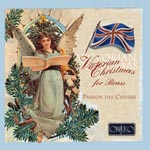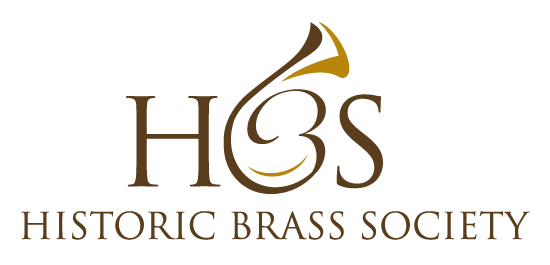 |
Victorian Christmas; Passion des Cuivres, 2006; Orfeo C 689 061 A.
Obtained from JPC Shallplatten, www.jpc.de (website in English), scheduled for wider distribution in the Fall of 2007.
For generations, brass playing has been an important part of musical life in Great Britain, with many of the advances in instrument development paralleling the popularity of the brass bands. Indeed, the popularity of brass ensemble music in Britain was such that for the first time rural and working class people had plenty of opportunities to hear high quality music making in their own communities. The brass quintet Passion des Cuivre (rhymes with 'peeve'), based in Berlin and including members from that city as well as from Dresden and London, was formed to revive the culture of 19th-century brass chamber music, especially that of the aforementioned tradition. Many HBS members will recall their fine performances at the Vintage Band Festival in Northfield, Minnesota in 2006. Using cornets in place of trumpets, a simple F horn, narrow-bore trombone and ophicleide, they perform both original works and arrangements of selections written for larger ensembles of the period. Their fine musicianship on period instruments won them the Nikolaus Harnoncourt Prize in 2005. This CD, given the alternate title Victorian Christmas for Brass, is the group's first commercial recording.
The performers on this CD are Robert Vanryne, Neil Brough and Amanda Pepping alternating on cornets, Steffan Launer on horn, Bernhard Meyer on trombone, Erhard Schwartz on ophicleide, and guest vocalist Constanze Backes, soprano. Adjunct performers include the bell ringing team at St. Andrew's Church, Sonning. All instruments used are period examples, with the exception of Schwartz's ophicleide, which is a modern reproduction.
The recording opens with melodic peals of church bells, segueing into Arthur Sullivan's Christmas Bells at Sea, a fitting selection for opening an album of Victorian Christmas music. This is followed by another Sullivan selection, "Hearken Unto Me, My People," an anthem that was originally for organ and choir but works nicely with the warm sounds of period brass. Next is the traditional 1849 carol "Once in Royal David's City", where the first verse is played here by solo cornet instead of the boy soprano often used in English Christmas services. Two more traditional songs follow, with "God Rest You Merry Gentlemen" being given a familiar brass quintet treatment, and "Hark, the Herald Angels Sing" passing the melody to solo ophicleide.
Three baroque selections follow, the Sinfony (Overture) and "He Shall Feed His Flock" from Handel's Messiah, with Backes' clear soprano voice joining in on the latter. The ophicleide gets a virtuosic solo opportunity in the same composer's "O Ruddier Than the Cherry" from the dramatic opera Acis and Galatea. History's last great ophicleide virtuoso, Sam Hughes, took the bass aria written for the character Polyphemus and made the solo his own. Recalling the Hughes tradition of ophicleide artistry, Erhard Schwartz delivers a fine performance. Following are more traditional songs, "O Little Town of Bethlehem," "O Come All Ye Faithful," and "Carol of the Bells." Henry Purcell's "Evening Hymn", "Now That the Sun Hath Veil'd His Light," is revived here in a gentle treatment by vocalist Backes.
Adophe Adam's beautiful "O Holy Night," also known as "Cantique de Noël," is here given a lush and moving treatment with the melody on horn until a cornet duet takes over. Next is Arthur Sullivan's setting of "It Came Upon the Midnight Clear," better known outside of England in its alternate setting by Richard Willis. Five more traditional carols follow, including "Joy to the World," "The Coventry Carol," "In the Bleak Midwinter," "O Come, O Come Emmanuel," and "The Three Kings." Excerpted here from Sullivan's Christmas drawing-room extravaganza "The Miller and His Man" is the bumptious tune "Care is All Fiddle-De-Dee," wherein listeners are urged to throw caution to the winds and indulge the excesses of the festive season. The recording concludes with another version of Christmas Bells at Sea, this time with ophicleide solo, segueing into the closing peals of church bells.
This CD was nicely recorded by Bayerischen Rundfunk, in a space that gives a nice light ambience. The playing is up to the high standard set by other top brass quintets, and is a delight to listen to. As a recreation of Victorian brass playing, the performers have done a commendable job, with the less strident and warm sound of 19th Century brass complementing the material. This recording also presents a fine example of solo ophicleide playing, and indeed no other instrument takes as many solos. This is also an excellent and very enjoyable Christmas album in its own right. Highly recommended.
--Paul Schmidt



